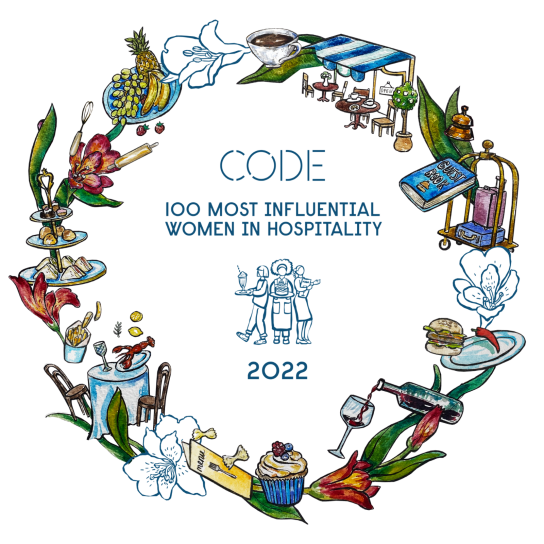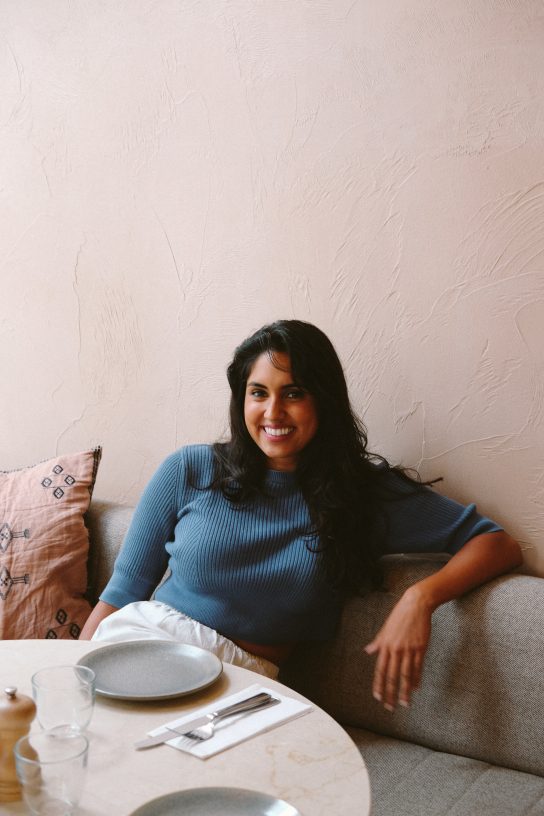
Mentor Award
sponsored by
Winner: Ravneet Gill

Gill has been a regular feature of our 100 Most Influential Women list in recent years and as her profile gets bigger, so does the impact of her mentorship to the industry. Her platform Countertalk, which promotes positive workplace culture, is a vital resource for sharing advice, support and a sense of community at scale. Between TV filming, podcasting and running her online cookery school, Damson Jelly Academy, Gill is busy hosting networking events and running practical skills workshops on topics from financing to brand building. More recently she and her team have launched Countertalk Spaces – a much-needed tool to connect chefs and pop-up venues, opening doors to usher in a whole new wave of brilliant industry talent.
In your personal channels and through Countertalk, you’ve been incredibly open and generous with your advice. Where has this sense of mentorship come from?
I feel a massive responsibility to help people avoid the same mistakes I made. Although it’s important for people to make mistakes to learn from them, there’s so much stuff that could’ve been avoided if I had been educated on things like, ‘What are my rights? What opportunities are you there? What can I achieve?’
It’s important to pass information on. A lot of the time doors are kept closed and you don’t see shit like how to get a cookbook deal.
It’s also important to say I’m a normal person. I’m not from a connected background at all, so I feel even more driven to help people like me see that they can get the same opportunities.
When I was at school – which was really rough – I didn’t have guidance on a lot of things. I didn’t know anyone who had written a book, I didn’t know any chefs, I couldn’t tell you what it was like to work in restaurants. I had no idea about any of it. But I could see how really well-connected people would sit together and things would pass within their circles. Because it was never given to me, I want to give it back. It’s a massive driver.
What was your first job in the industry?
My first job was work experience at a private members’ club, because my dad’s friend worked there once and so asked if I could too. At this stage I didn’t know The River Café existed. I didn’t even know that St. John existed.
When I was considering becoming a chef, I was always watching people on TV – Michel Roux, Raymond Blanc, a lot of French chefs. But I didn’t think that was a bad thing or that, because they didn’t look like me, I couldn’t be them. I thought, yeah, I can do that. I was still inspired by those people.
Angela Hartnett has been a role model. Not because she’s a woman but because she’s powerful and really good at what she does.
I don’t think I’ve ever had a specific mentor but there’s been people like Jonathan [Woolway] from St. John who would pick me up every time I fell down.
Why did you start Countertalk?
Countertalk came about because I didn’t think that anything like this existed. It’s my way of being really specific in helping other people who work in hospitality. I get people DM-ing all the time on Instagram saying, ‘oh I’d love to work at X, would you mind telling me how I can do it’, and I can say, ‘here, I wrote an article’, or ‘here’s the podcast’.
I get a lot of messages but if I helped everyone on an individual basis, firstly it would take up all my time, but also, I wouldn’t get the reach. With Countertalk I’m able to help way more people. Our articles reach thousands of people so the impact is far more powerful.
What advice has resonated most with people?
People have loved the transparency around cookbook deals. I was like, look, I got seven grand for my first cookbook. It demystifies this whole thing about people thinking that you’re rich cause you wrote a book. Breaking that down to people and explaining that your agent takes 12 per cent, then you only get a third here and a third there.
Being honest about that is so important. What are we hiding from? That has helped a lot of people realise, ‘OK, I got four grand and that’s not so bad’. I’ve had so many messages to say, ‘I’ve accepted a cookbook deal because of your talk’.
Recently you launched Countertalk Spaces. It seems like a continuation of your mentorship in a scalable way, opening doors and connecting people.
When I was working as a chef, one of the best things for my career was doing pop-ups. They allowed me to practise and try new things. They humbled me. If that process had been more seamless, I probably would have done more of them and made more connections in the process.
The admin of pop-ups is so difficult. Even when I was at St. John I didn’t know anyone who had a café I could do one in. Getting an in at Passo took me years because I didn’t have the connections. It’s all about giving those people the possibility to more easily make them.
What you’ve built seems like a modern version of being a mentor. Would you agree?
When you grow up you think you’re going to get this magical person drop out of the sky and be your mentor. That doesn’t happen most of the time. I don’t have someone who mentors me – I would love for that person to fall out of the sky. There are people I look up to. But I also listen to podcasts that really help me. I’m always listening to people who have started businesses that are different to mine so I can take something from them.
Damson Jelly Academy is another example of building a platform to teach and mentor people with the widest possible impact. How does that work?
Damson Jelly Academy is an online cooking school with basic and intermediate baking and cooking courses. It’s just as meticulous online as it would be in person and for every beginner’s course I sell, I give one away to kids in schools. But actually, I give the places out more liberally than that – from young carers to younger adults in care, to kids from disadvantaged backgrounds who want to learn for free, they can all get access to it.
A message from the award sponsor
Hospitality is an industry like no other. It’s dynamic, exciting, rewarding and challenging, offering the opportunity for endless learning for the curious, boundless travel for the enthusiastic and unlimited possibilities for the creative.
But it wouldn’t exist without those who work tirelessly to hone the art and craft of hospitality, who share their countless lessons learned, who equip the next generation of hospitality stars with the training, support, skills and knowledge, confidence and connections to go forth and make their own mark. There is only so much you can learn from a book.
One of our four company mantras (or values) at Mr Yum is ‘Here to Serve’ – which means we’re customer-obsessed, responsive and always lead with empathy for the hospitality industry. It’s a value we embody throughout our company and new team members feel its embrace from day one – quite literally, as we love a hug at Mr Yum – when they are welcomed by staff from across departments who are there to share their knowledge and experience over the coming weeks and months. This fosters our culture of teaching and continuous learning, which we see as vital to our success.
Championing the female stars of UK hospitality, those who are changing the industry for good, who are creating roles for the future and empowering the next generation to push boundaries and build a better tomorrow today is something all of us at Mr Yum are so proud to support.
There is more to be done, but with the likes of Ravneet Gill leading the way for the next generation, the industry will only become stronger, more resilient and rewarding and, importantly, more attractive as a lifelong career for women.
Kim Teo, CEO and co-founder, Mr Yum
Read this year’s full list of our 100 Most Influential Women in Hospitality here

